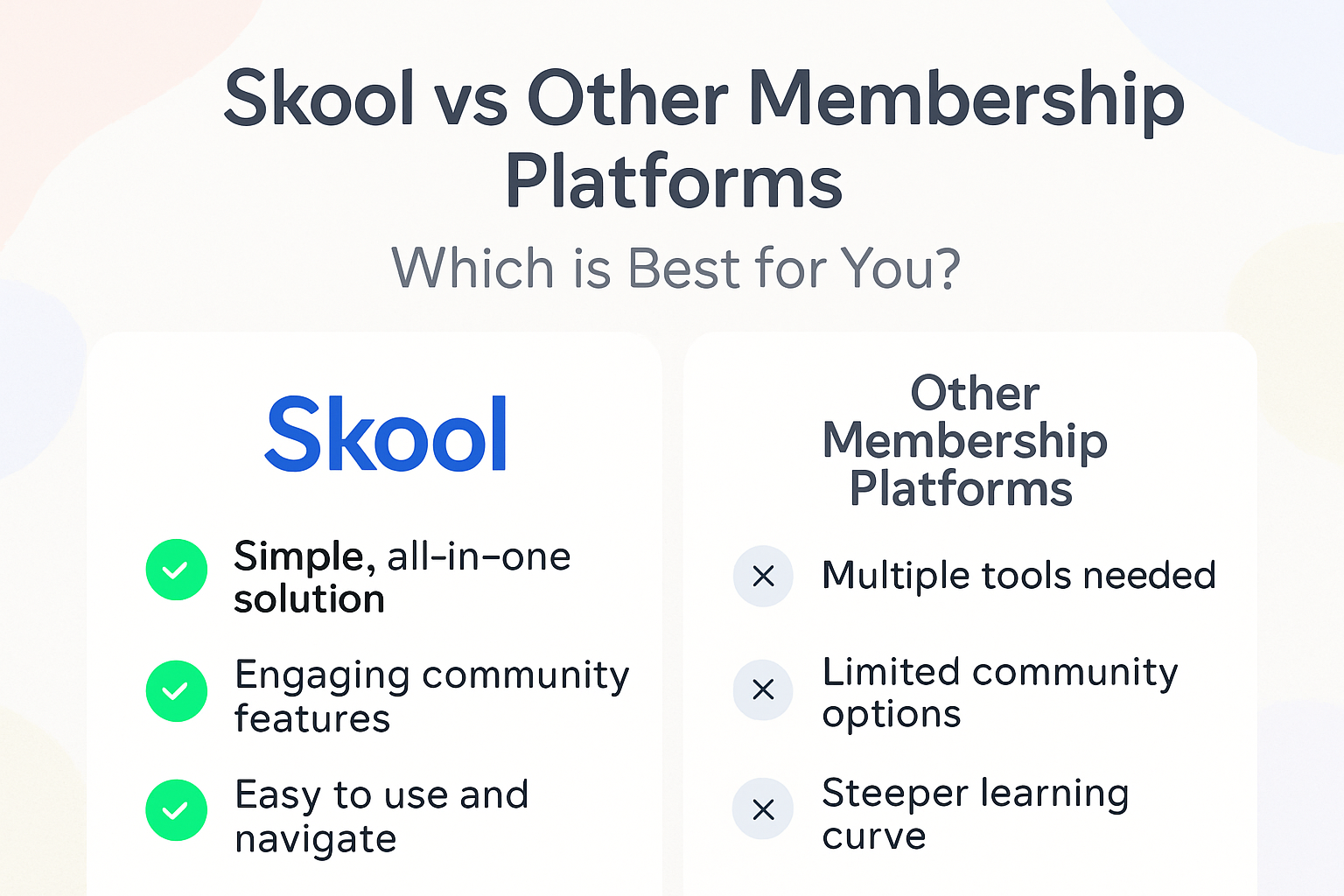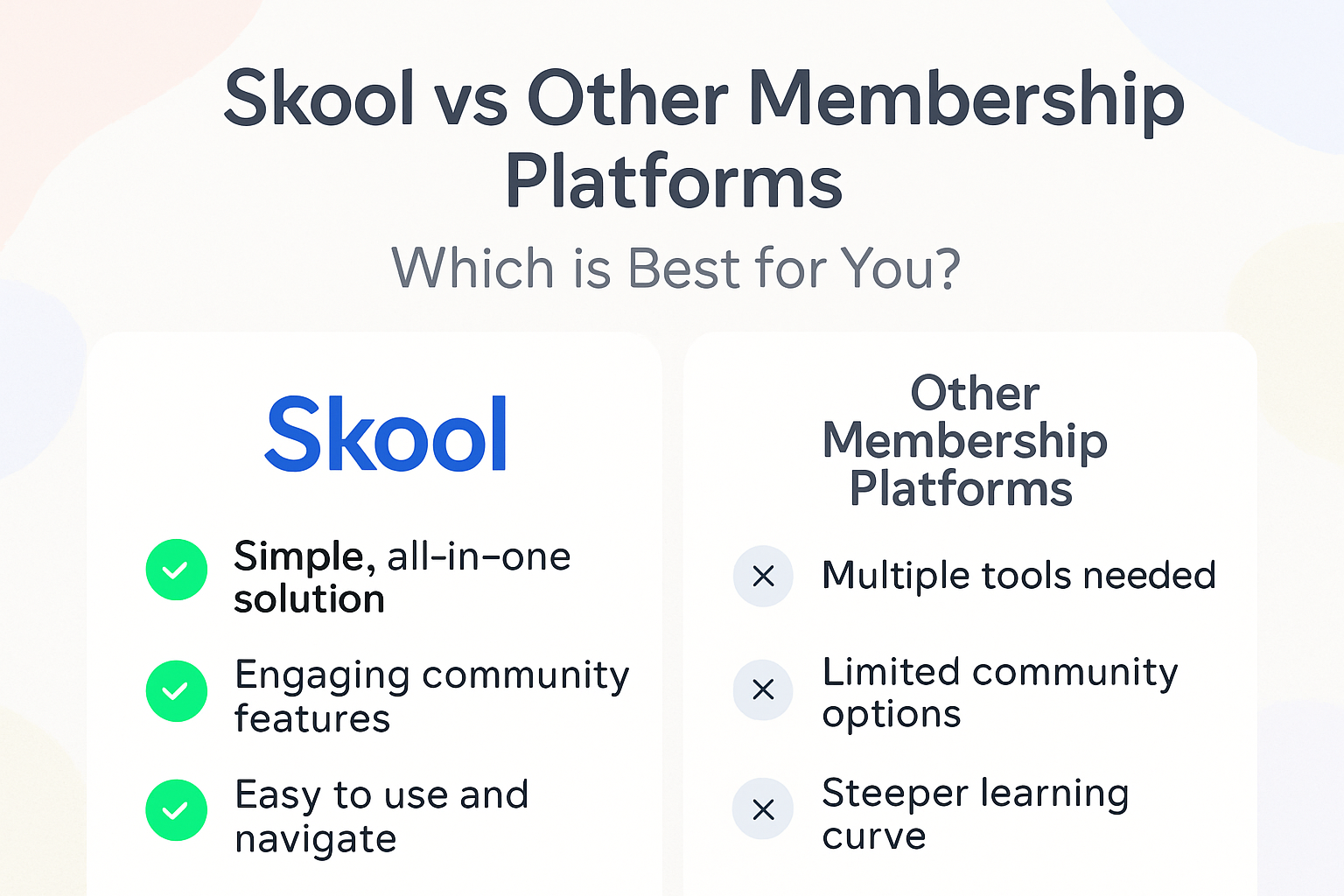Skool vs Other Membership Platforms: Which is Best for You?
Trying to choose the best membership platform? Compare Skool with other membership platforms to find out which one fits your needs. Learn about features, pricing, ease of use, and community tools to grow your paid group successfully.

Table of Contents
Choosing the right membership platform can make or break your online community. I remember when I first wanted to start a paid group—I felt overwhelmed by all the options. From Kajabi, Teachable, and Mighty Networks, to Thinkific, each platform promised amazing features, but I needed something that combined courses, community, and memberships in one place.
That’s when I discovered Skool, and it completely changed the way I run my groups. In this post, I’ll share my comparison of Skool versus other popular membership platforms so you can decide which is the best fit for you, whether you’re starting your first online community or scaling an existing one.
If you’re ready to try Skool for yourself, you can sign up here: Join Skool.
Why Choosing the Right Platform Matters
I learned early on that the platform you pick affects everything—from member engagement to revenue management. The wrong platform can lead to technical headaches, low engagement, and frustration for both you and your members.
When I compared platforms, I focused on:
- Ease of use
- Community engagement features
- Course and content management
- Payment and subscription tools
- Pricing and scalability
By prioritizing these features, I could choose a platform that would support long-term growth.
Bold keywords: membership platform, Skool, online community, paid group, membership site
Skool Overview
Before comparing, here’s why I personally love Skool:
- All-in-One Platform: Courses, memberships, and community in one place.
- Engagement Tools: Discussion boards, polls, and challenges keep members active.
- Simple Payments: Recurring subscriptions are easy to manage without extra tools.
- User-Friendly: I didn’t need coding skills to get started.
- Modern Design: Both desktop and mobile interfaces are clean and intuitive.
Skool makes running a paid group online straightforward. I can focus on creating content and engaging my members instead of juggling multiple platforms.
How Skool Compares to Other Platforms
Here’s my comparison based on my personal experience and research:
1. Skool vs Kajabi
Kajabi is known for its robust marketing and course tools. I considered it, but here’s what I noticed:
- Pros: Powerful course builder, strong email marketing, good analytics.
- Cons: Expensive, separate tools needed for community engagement, slightly complex setup.
Skool Advantage: I don’t need separate tools—community, courses, and subscriptions are integrated. It’s much simpler for someone starting out or who wants to focus on engagement.
2. Skool vs Teachable
Teachable is great for online courses, but:
- Pros: Easy course creation, good sales features.
- Cons: Limited community features, engagement requires third-party tools.
Skool Advantage: Members can interact naturally within the platform, which keeps the community alive without extra apps.
3. Skool vs Mighty Networks
Mighty Networks is often compared directly to Skool because it’s community-focused.
- Pros: Strong community tools, branded mobile app, event hosting.
- Cons: Learning curve is higher, pricing can get complex, course integration is less seamless.
Skool Advantage: Combines community + courses + memberships with a simple interface. I found it easier to start quickly and manage growth.
4. Skool vs Thinkific
Thinkific is another popular course platform.
- Pros: Easy course creation, strong analytics, good student management.
- Cons: Limited community tools, engagement requires integrations.
Skool Advantage: I can run a community alongside my courses, which keeps members coming back and reduces churn.
Features That Make Skool Stand Out
From my experience, these are the features that helped me grow my community faster than with other platforms:
- Community + Courses in One – No need for multiple tools.
- Recurring Payment Management – Easily charge and track subscriptions.
- Engagement Tools – Polls, badges, and discussion boards keep members active.
- Mobile-Friendly – Members can engage anywhere, increasing retention.
- Simple Onboarding – Members join and start participating immediately.
Pricing Considerations
Pricing is a big factor for creators. I compared platforms and found:
- Kajabi: High monthly cost, great for marketers.
- Teachable: Affordable for courses, but lacks community features.
- Mighty Networks: Community-focused, can get expensive with features.
- Thinkific: Course-focused, community requires add-ons.
- Skool: Affordable, all-in-one solution for starting or growing a paid group.
For me, Skool struck the perfect balance of price, simplicity, and functionality.
Which Platform is Best for You?
I’ve shared my experience, but the right choice depends on your goals:
- If you want an all-in-one solution for courses and community → Skool is ideal.
- If you need advanced marketing automation → Kajabi may suit you.
- If you only want to sell courses → Teachable or Thinkific works.
- If community is your main focus → Mighty Networks could fit, but it’s more complex.
Personally, Skool gives me everything I need to run a paid group, engage members, and grow my community quickly, without technical headaches.
If you’re ready to try Skool and see why it’s my top choice, you can sign up here: Join Skool.
Final Thoughts
Choosing the right membership platform can save time, reduce frustration, and help your online community thrive. I’ve tested multiple platforms, but Skool stood out because it simplifies management, enhances engagement, and helps grow a paid group quickly.
Whether you’re just starting out or looking to move your existing community to a better platform, Skool is worth considering. It allows me to focus on what I love—creating content and engaging my members—without worrying about technical setups or integrations.
Start your Skool community today and experience the difference for yourself: Join Skool.
One thing I’ve learned is that community engagement is the real differentiator between platforms. You can have amazing courses, but if members aren’t interacting, retention drops fast. Skool’s built-in discussion boards and polls make it easy to foster conversation, and I’ve noticed that my members are more active than they were on other platforms I’ve tried.
Another factor to consider is onboarding new members. When I switched to Skool, I realized how crucial first impressions are. Skool allows me to set up welcome messages, introductory content, and easy navigation, which makes new members feel comfortable and encourages them to participate right away. This is something many other platforms lack or make unnecessarily complicated.
I also want to highlight content accessibility. With mobile-friendly access, my members can join discussions, watch lessons, and participate in challenges from anywhere. Platforms like Teachable or Thinkific are great for desktop, but I noticed less engagement on mobile. Skool ensures my community stays active, regardless of where members are.
Integration options are another important consideration. I like to automate certain tasks, like email notifications and analytics tracking. Skool supports easy integrations and reduces the need for multiple apps, which saves me time and keeps everything in one place. I’ve found this much simpler than trying to connect separate tools across other platforms.
Finally, the long-term scalability of a platform matters. As my community grows, I need a platform that can handle more members, more content, and more features without becoming overwhelming. Skool grows with you, offering the flexibility to add courses, challenges, and memberships without worrying about technical limits, which makes it an ideal choice for both new creators and experienced entrepreneurs.







Thanks for helping out, wonderful information.